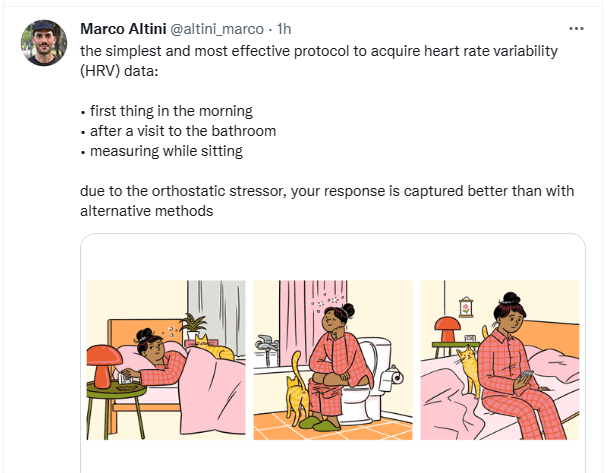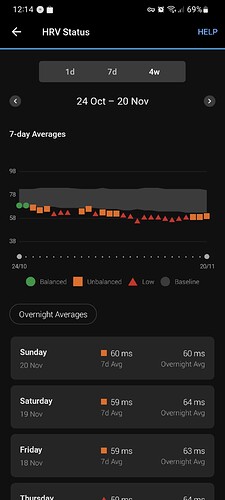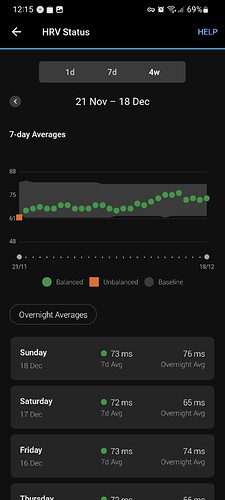Hi,
Thinking of using Elite HRV to integrity check the HRV readings given to me via my Garmin Epix Gen 2. Anyone have any experience of which is more accurate?
What do you mean by Elite HRV accuracy?
The accuracy of readings gathered by the Elite HRV app will depend on the unit used to measure.
Wahoo Tickr is a popular HR monitor NOT recommended for HRV readings.
Polar H7, H9, H10 will all provide accurate data.
Elite HRV themselves sell a CorSense finger sensor.
Sorry, didn’t explain myself very well.
What I meant is the accuracy of Garmin watches (Epix Gen2) in actually measuring HRV on the wrist and the reading it spits out each morning. Was wondering if measuring it via a chest strap / arm strap (Polar H10 or Verity Sense) are more accurate in reading HRV. I’m also led to believe that putting your finger over the camera on our IPhone is also an accurate way to measure HRV via one app that I saw.
Ah. I see. I remember reading recently on a thread from Marco Altini of HRV4Training that latest wrist watches produce similar accuracy to Polar chest straps.
I don’t really know enough though to give a properly informed answer. Call me old fashioned, but I’ll stick with the Polar 
See article link below. I had a real quick glance at this. Didn’t read it in detail. I think the jist is that the actual data produced is accurate but beware of interpretation of that data
I use epix and it works ok. Meaning i got reading which more or less corespond to my overall health (will to train, being kknd of tired and ill etc) actually it kind of predicts for me future peoblems. I used hrv4training and I thinkitnis much more accurate (garmin takes avg frlm whole sleep) but for me it was to hard to remenber to put on my strap and measure. Flr me garmin can beless accurate but it is measuring in the bacground and i Just tracę the results.So at the end it is better to have less quality measures then none.
Agreed, measuring my HRV via my watch which I rarely (if ever) take off is easy but Elite HRV reckons a 1-2 minute test in the morning via a HR strap is all that is needed to get an accurate HRV. But it was a pain having to wet the strap, put it on, lie down and take the measurement. It will be interesting to see over time if there are any major differences between the two in my HRV readings.
The article by Marco Altini shows that Garmin’s data is now also reliable. But you should not compare HRV values in any case. Different techniques give different absolute results. Morning vs entire night, strap vs optical, etc… will all yield different numbers. But that’s not problematic because what you’re interested in, is the trend. So once you make a choice, stick to it or if you want to change the method of getting the data, provide an overlapping period of at least 30 days to help making sense of the differences in the absolute values.
Hmmm
The more I read about this the less inclined I’d ever be to use an overnight wearable to monitor HRV.
What’s critical is being able to repeat the measurement position. This is not possible when this measurement is taken at night. You could be lying on your back one night, your side the next, your stomach the next. Your arm could be above your head, at your side, under your head etc etc
This was highlighted in some article I read recently. Can’t remember who wrote it.
The single best way to provide consistent measurements is a morning reading. You can repeat the routine day after day, week after week month after month with a consistent measurement position. Pick your app to record, be it HRV4T, EliteHRV, iThlete, Kubios or whatever. Personally wouldn’t rely on an Oura or Whoop for a HRV analysis. The body position and time of the data collection cannot be repeatable with an overnight wearable.
That was the analysis until recently and this has been advocated many many times. You will see this in numerous articles published over the last few years.
But the article from Marco is more recent and based on a quite intensive research period. It shows now that things can be trusted, if you pay attention to the trends. And if you stick to one single method.
Things evolve rapidly and it isn’t always easy to stay on top. I would advice to always check the date of the articles, to know which one is probably more accurate based on more recent research.
Looking at my garmin results from a whole night it gets even more complicated. My sleep pattern is not 100% constant all the time, I sleep 8h most of the time but sometimes I just go much later to sleep. When I go later to sleep i usually get a little higher result, probably my body is still in a natural sleep regime, but hrv is rising during a day so it is higher by the end of the shifted sleep. There is not a huge of a diffrenece when measured by garmin, while it is avg from a wholennight, but I imagine with a such sleep pattern and measuring in the morning, getting constant results can be at least tricky. As I said earlier I don’t think garmin is 100% correct but there is a point in averaging some things, at least there is no chance I would sleep always at the same time. For me it is just an another indicator that something is going on with my body. I attach two pics of my hrv log in garmin. I thought that garmin is acting up with those lower levels, but after 3-5 five days of that i felt much worse then usual (worse sleep, lower mood, higher anxiety etc) but decided to still train (stupid me). Second picture is after a recovery week and some days with focus on sleep, positive thinking and relaxing.
ps. I know my approach to hrv is pretty basic but I’m trying to limit number of numbers in my life and focus much more on my body and signals it gives me 
That’s not ‘basic’. That’s exactly what you should do. The numbers don’t give you the only ‘truth’. But they give you a warning that maybe something is going wrong. It should trigger you to investigate a bit more then usual and try to find out what exactly is going on.
Numbers out of the normal range can mean a recovery or health problem, but it could also be the result of a poor measurement caused by distraction during the measurement or a problem with the sensor or …
If you have a very constant routine of sleep/train/measure, tings will be more stable. But if for some reason, you train late in the evening, it is normal that a whole night measurement will yield a lower result. Simply because a big part of the night contains the early recovery phase. Opposed to when you train early in the morning and then have a work day with little physical activity where most of the recovery has already happened before you go to sleep.
I started using Elite HRV with the H10 and have a chart showing the Garmin HRV as well, and they do differ (as in Garmin is indeed more influenced by the last evening).
Now I’m thinking of getting the Oura V3 for better sleep tracking (Garmin kinda sucks, and I only have one Withings Sleep Sensor, so half of the week I’m not getting any data from there). So I’ll probably switch to manual readings using the Oura (3min “workout” to get HRV - first thing in the morning, just like the Elite HRV/H10 I’m doing now)
I’ve only done one morning reading so far with EliteHRV and H10. Garmin gave me a HRV avg of 53 (throughout my sleep of 7h30m) on my watch whereas EliteHRV gave me a reading of 58 for the 2min test soon after waking. I’ll track both over the next few weeks and see if overall averages align.
Just posted by Marco Altini on Twitter.
Most effective method for recording HRV is first thing in the morning while sitting. No mention here of device preference. Link below to an article he wrote in June this year

How Should You Measure Your Morning Heart Rate Variability? (HRV) | by Marco Altini | Medium
Great to know as my wife thinks it very strange that the minute I arise in bed, I go put my HR strap on, lie back in bed and take my readings. (ha ha)

As it happens I’ve always kept the same routine since I started recording HRV 3 years ago.
Pretty much identical to what Altini says in that tweet.
I use my Garmin HRM-Pro chest strap and it works a treat. All the EliteHRV material I have read strongly suggests a Polar H10 which I have but find the Garmin more accurate and reliable in my heart rate tracking. What do you use?
Polar H9
Polar H10 but with the strap from the Garmin Dual. I had problems with the original Polar strap after only 8 months of use.
Garmin Dual gives very good results for rMSSD with Kubios and in general, but I decided to buy a Polar H10 because it is so widely used by developers and it is as far as I know the only one on the market at this moment that can output an ECG trace (130Hz sample rate).
Polar H10 and EliteHRV for 18 months+ now

